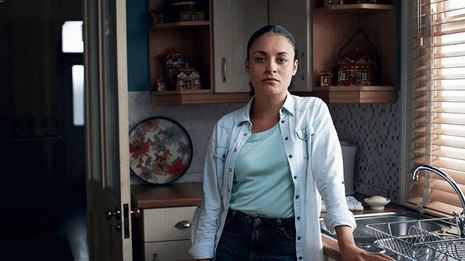The Outside Dog: Murder, marriage, and domestic violence in the age of Covid-19
Columnist Katie Ashmore-Marsh reviews the latest BBC incarnation of Alan Bennett’s “The Outside Dog”.

Alan Bennett’s Talking Heads is a series of monologues that has already been made for TV twice, once in the 1980s, and again in the 1990s. In 2020, during the first lockdown, the monologues were reprised with an all-star cast including Martin Freeman, Jodie Comer and Tamsin Greig. Of course, the pandemic necessitated that the monologue form take centre stage in these productions and later in their brief theatre run, with some of the pieces performed at the Bridge.
Talking Heads was one of several other monologue pieces filling (to a third of capacity, naturally) theatres last autumn, with the National Theatre and the Apollo also jumping on the bandwagon. The whole run of these monologues (now available on iPlayer) is wonderful, but it was The Outside Dog that stayed with me.
“Because the production was released during lockdown, with the noted rise in cases of domestic violence, I found Marjory’s transformation to be especially visceral.”
On a surface level the piece deals with a house-proud wife, Marjory, and her hatred for her husband’s dog, Tina. Rochenda Sandall is incredible as Marjory, whose claustrophobic and compulsively-cleaned walls shut in on her as the play unfolds. We see her husband accused and acquitted of a string of brutal murders and her unreported discovery of his involvement. Nadia Fall’s direction is excellent, with Marjory moving from seeming bored in a dysfunctional relationship, to practically screaming with fear at the camera – finally culminating in tears and blank stares. Because the production was released during lockdown, with the noted rise in cases of domestic violence, I found Marjory’s transformation to be especially visceral. Fall’s decision to have the lighting move continually darker – from daylight, to the flicker of a TV screen, and finally only the illumination of moonlight – is a genius move to reflect the encroaching sense of danger that the walls of Marjory’s home hold.
Indeed, the repeated framing of Marjory in liminal spaces emphasises her inability to escape as she appears in door frames, hallways, next to the stairs, or glancing out the net curtains of a window. In contrast, I have since watched the 1998 version, played by Julie Walters. Whilst Walters brings out a humour in Marjory’s droll statements that Sandall chooses not to, the bright set with mostly artificial light only adding to the comic style, it feels almost like a nag has had her comeuppance when we have her final lines delivered into a silent house. I found the recent version much more haunting; perhaps this is because I watched Sandall first, with contextual knowledge of the potential danger for women in her position during lockdown. Still, Sandall’s final lines and her facial expression as we hear the stairs above her creaking – and the titular dog barking for the first time in the show – left me uneasy long after the camera faded to black.
 News / SU stops offering student discounts8 January 2026
News / SU stops offering student discounts8 January 2026 News / Uni-linked firms rank among Cambridgeshire’s largest7 January 2026
News / Uni-linked firms rank among Cambridgeshire’s largest7 January 2026 Comment / Plastic pubs: the problem with Cambridge alehouses 5 January 2026
Comment / Plastic pubs: the problem with Cambridge alehouses 5 January 2026 News / New movement ‘Cambridge is Chopped’ launched to fight against hate crime7 January 2026
News / New movement ‘Cambridge is Chopped’ launched to fight against hate crime7 January 2026 Comment / What happened to men at Cambridge?31 December 2025
Comment / What happened to men at Cambridge?31 December 2025









